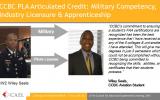Assessment and Evaluation

The COVID-19 pandemic and subsequent shift to online learning demonstrated to us that students can not only adapt, but also thrive when provided with diversified and complimentary instructional modes (Ascione, 2021). Inspired by the resiliency of our students, the Geographic Information Systems (GIS) department welcomed students back to Austin Community College (ACC) campuses by piloting a new course modality—Hybrid Flexible, or HyFlex. The HyFlex modality combines online and face-to-face teaching and learning activities in a regularly scheduled class where students are given the choice to...

Digital badges, or micro-credentials, are portable, verifiable, data rich, digital representations of attained knowledge and skills that provide evidence of specific, tangible skills: cognitive, soft, and technical. Digital badges align training with the needs of the workforce, and provide Madison College the opportunity to award meaningful and recognized credentials that go beyond the traditional boundaries of our degrees. They also empower individuals to take their learning achievements with them, wherever they go, allowing the earner to own their knowledge.
Madison College has been issuing...

Assessment is an integral component to refining teaching, support services, and operations. It informs the choices we make and helps us make continuous improvements to our programs and processes. At Bergen Community College (Bergen), the Assessment Fellows Program provides a systematic approach for college faculty and professional staff to assume leadership in collegewide assessment as well as a unique opportunity to ensure quality of assessment plans for the institution.
After our accreditor noted that Bergen did not have a clear assessment process in place, the college began placing greater...

As higher education evolves to accommodate new forms of learning and new workforce needs, skills are being assessed across an ever-widening range of activities within the learning landscape. Campus-based and online degree programs; professional certificates; competency-based education; open online courses; professional development initiatives; cocurricular and extracurricular activities; and programs in service learning, information literacy, and entrepreneurship are just some of the higher education settings in which competencies worth recognizing are demonstrated or observed. Digital badges...

The Community College of Baltimore County (CCBC), Maryland, is one of 20 community colleges nationally selected by the American Association of Community Colleges (AACC) to participate in the Right Signals Initiative designed “to identify and develop a national model for recognizable credentialing.”
According to the AACC announcement release,
The purpose of the Right Signals Initiative is to demonstrate a new credentialing model that recognizes multiple quality credentials to send “the right signals” to employers, students, and colleges about the meaning of these credentials. Key credentials...
September
2015
Workforce programs have long been acknowledged as centers of innovation on every community college campus, and now a new evaluation system can help college workforce leaders demonstrate the learning quality of their instructional programs.
The Workforce Education Implementation Evaluation (WEIE) framework, developed by SRI International in Menlo Park, California, is based on a six-year case study supported by the National Science Foundation of five workforce education programs across the United States. It features tools and concepts that make it possible for program leaders to assess the hard...
March
2015
In fall 2012, I applied for a Learning Challenge Grant to develop and present a hands-on workshop that would introduce a counseling, assessment, and retention tool (CART) system to the Electronics Engineering Technology (EET) department faculty and staff at Sinclair Community College (SCC). After this workshop, the goal was to offer it to the Science, Mathematics, and Engineering (SME) division, then to all SCC faculty.
The workshop was requested to:
Develop teamwork within the EET department;
Enhance the overall success rate of students and faculty by implementing a system to increase the...
2010
This guide is a product of the League's Significant Discussions Project, and was created to facilitate discussions between secondary and postsecondary faculty and administrators, and business, industry, and community partners. The Significant Discussions guide is a comprehensive set of tools to assist these partners in their collaborative work to better align curriculum across institutions, thus easing student transitions from high school to community college and university transfer. The guide is based on effective practices in place at nine participating sites and promising practices...









